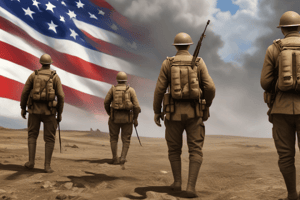Podcast
Questions and Answers
Who assassinated Archduke Franz Ferdinand on June 28, 1914?
Who assassinated Archduke Franz Ferdinand on June 28, 1914?
- Emperor Wilhelm II
- King George V
- Gavrilo Princip (correct)
- Mikhail Bakunin
Nationalism can both unify a nation and cause intense competition among nations.
Nationalism can both unify a nation and cause intense competition among nations.
True (A)
What was the policy of glorifying military power and keeping a large standing army prepared for war called?
What was the policy of glorifying military power and keeping a large standing army prepared for war called?
militarism
During World War I, the area between the trenches was known as _______.
During World War I, the area between the trenches was known as _______.
Which battles are considered as examples of senseless slaughter during World War I?
Which battles are considered as examples of senseless slaughter during World War I?
What new secret weapon was deployed by the British during the Battle of the Somme?
What new secret weapon was deployed by the British during the Battle of the Somme?
World War I was known as the First World War because of its global involvement.
World War I was known as the First World War because of its global involvement.
Mechanized warfare in World War I involved the use of advanced ______.
Mechanized warfare in World War I involved the use of advanced ______.
Match the following components with mechanized warfare in World War I:
Match the following components with mechanized warfare in World War I:
Flashcards are hidden until you start studying
Study Notes
The Great War (1914-1918)
Trigger and Causes of the Great War
- June 1914: Archduke Franz Ferdinand and his wife visited Sarajevo in Bosnia, where they were assassinated by a Serbian nationalist, Gavrilo Princip.
- The event triggered a series of reactions that led to the outbreak of World War I.
- The Austrian emperor, infuriated by the assassination, blamed the Serbian government and consulted with Wilhelm II of Germany.
- Austria declared war on Serbia, leading Russia to mobilize its army in support of Serbia, and Germany declared war on Russia and France.
Causes of the Great War
- Nationalism: A growing sense of nationalism in Europe led to intense competition among nations, with each seeking to overpower the other.
- Imperialism: The quest for colonies and overseas empires pushed European nations to the brink of war.
- Militarism: The buildup of military power and the glorification of military force contributed to the outbreak of war.
- Alliances: The complex system of alliances between European nations, including the Triple Entente and the Triple Alliance, made war almost inevitable.
Course of Events of the Great War
- 1914: Germany invaded Belgium, leading Britain to declare war on Germany.
- 1916: Battles of Verdun and the Somme, with heavy casualties on both sides.
- 1917: The United States entered the war after Germany resumed unrestricted submarine warfare.
- 1918: Germany launched a final offensive on the Western Front, but was repelled by the Allies.
Characteristics of the Great War
- World War: The war involved many countries from different parts of the world.
- Modern War: The war saw the introduction of new technologies, including tanks, airplanes, and poison gas.
- Total War: The war required total mobilization of resources, leading to the involvement of civilians in the war effort.
- Egalitarianism: The war laid the basis for an egalitarian society, as everyone in the trenches was equal.
Studying That Suits You
Use AI to generate personalized quizzes and flashcards to suit your learning preferences.




